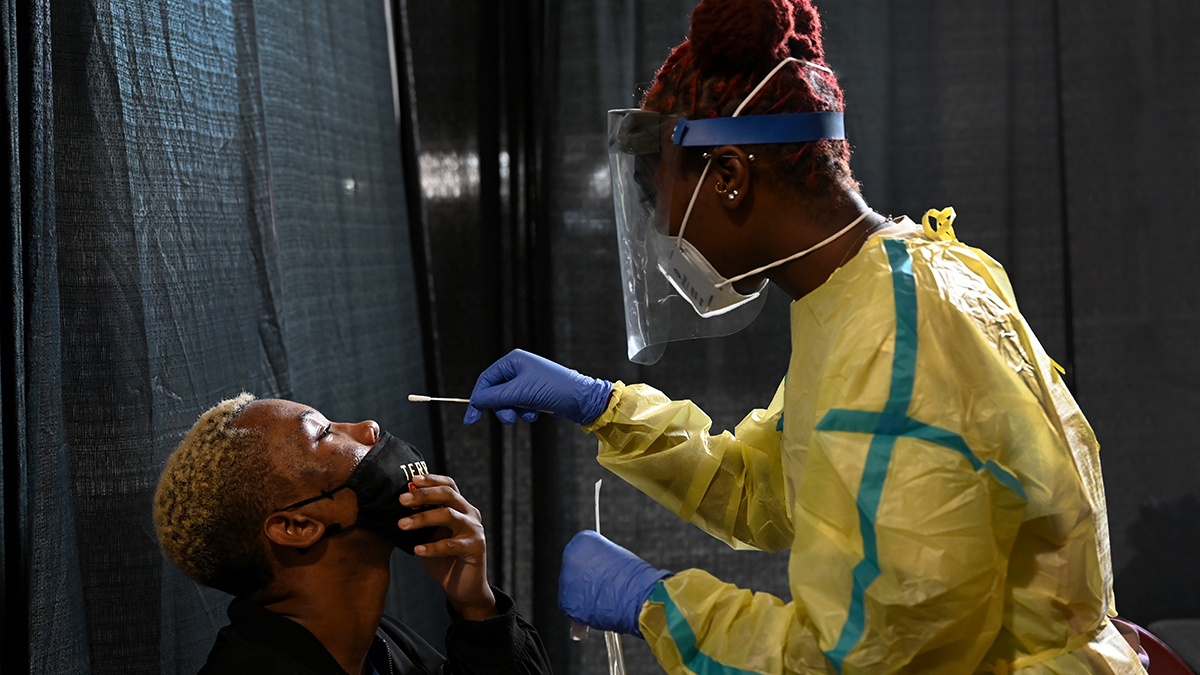The Food and Drug Administration issued an emergency use authorization for Moderna’s coronavirus vaccine, setting in motion plans to roll out a second coronavirus vaccine.
The nation’s top infectious disease expert Dr. Anthony Fauci says data suggests the vaccine seems to reduce asymptomatic infection by 63% after a single shot. The Pfizer shot only prevents symptomatic infections.
We're making it easier for you to find stories that matter with our new newsletter — The 4Front. Sign up here and get news that is important for you to your inbox.
That could be key in dramatically slowing the spread of the virus.
D.C. is preparing a slew of new restrictions to curb the surge in COVID-19 cases.
Starting Wednesday, indoor dining will be banned until at least Jan. 15, which would bar restaurants from seating customers over the Christmas and New Year’s holidays.
Large indoor venues like museums and libraries will also be forced to close.
Meanwhile, grocery stores are now exempt from capacity limits, but they've been given a mandate to implement social distancing measures.
What the Data Shows
New coronavirus cases continue to level off in the region, but hospitalizations are trending upward in D.C. and Virginia.
In Virginia, hospitalizations surged to an all-time high, with 2,111 Virginians hospitalized on Saturday. The state reported 2,636 new cases.
D.C. reported 238 new cases and 248 hospitalizations on Saturday.
Maryland reported 2,201 new cases. Hospitalizations are at 1,635 on Saturday, down from an all-time high of 1,799 on Tuesday.
Local Coronavirus Headlines
- The stress of the pandemic is a grind. A data analysis from the American Dental Association shows a surge in cases of teeth grinding, clenching and cracking during the COVID-19 crisis. The increases are striking and potentially costly and painful for sufferers.
- All Maryland hospitals are expected to receive some COVID-19 vaccines in the next two weeks to begin vaccinating critical frontline staff, a state health official said Tuesday.
- A professor is using the trust Black Americans have in barbers to make them more comfortable with taking the COVID-19 vaccine.
- Meet "The First Five," the group of D.C. emergency responders who will be the first members of the D.C. Fire and EMS Department to get the COVID-19 vaccine this coming week.
- A rapid antigen test might seem like a great idea when you're in a hurry and don't have time to wait a few days for results, but those tests are really designed for people with COVID-19 symptoms and in asymptomatic patients can deliver false positive results.
- News4 has obtained a list of two dozen Maryland hospitals expected to receive the first shipment of Pfizer vaccines once it receives emergency authorization from the Food and Drug Administration.
- Health officials in Virginia say they'll likely have to scale back on contact tracing because coronavirus transmission levels are rising so high.
- Help is available for thousands of D.C. residents who have fallen behind on rent payments.
- D.C. Public Schools is preparing for an ambitious pilot program in which it will regularly test some students and staff for the coronavirus.
- Maryland Gov. Larry Hogan announced measures to boost the number of available health care workers and plan for more hospital beds.
- COVID-19 numbers continue to paint a dire picture for Black Americans, and there is an ongoing effort in the Black community to increase testing.
Reopening Tracker
- D.C. is set to suspend indoor dining starting Dec. 23 at 10 p.m. and continuing until 5 a.m. on Jan. 15, Mayor Muriel Bowser said in a press release.
- Virginia instituted a curfew and a stricter mask mandate.
- Montgomery County's executive has proposed suspending indoor dining, tighter capacity limits at religious institutions and other new restrictions that would take effect 5 p.m. Tuesday, if approved by the county council.
- Maryland tightened restrictions on businesses, bars and restaurants.
- All Smithsonian museums and the National Zoo closed because of rising COVID-19 cases, officials announced.
- Hours before some Fairfax County students were set to return to in-person learning, the school district said that they needed to delay the plan.
- Courts throughout Maryland partially shut down due to the pandemic.
- Virginia announced new measures to fight COVID-19 as cases of the virus have spiked across the country.
- Prince George's County tightened restrictions and required masks to be worn outdoors.
- Montgomery County reduced capacity limits at many businesses, including for indoor dining, to 25%. The county previously stopped giving waivers for alcohol sales after 10 p.m.
- D.C.'s mayor extended the city's coronavirus state of emergency to last through the end of the year.
How to Stay Safe
There are ways to lower your risk of catching coronavirus. Here are guidelines from the CDC:
- Wear a snug-fitting mask that covers your nose and mouth.
- Avoid being indoors with people who are not members of your household. The more people you are in contact with, the more likely you are to be exposed to COVID-19. If you are indoors with people you don’t live with, stay at least six feet apart and keep your mask on.
- Wash your hands often, especially after you have been in a public place.



